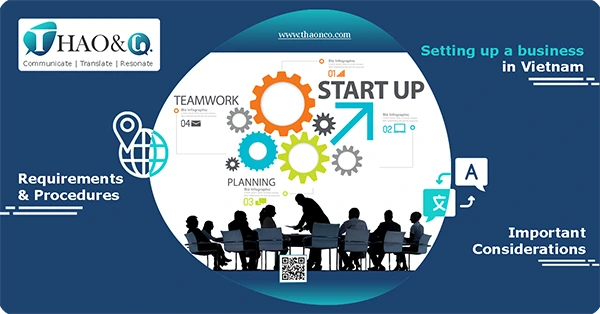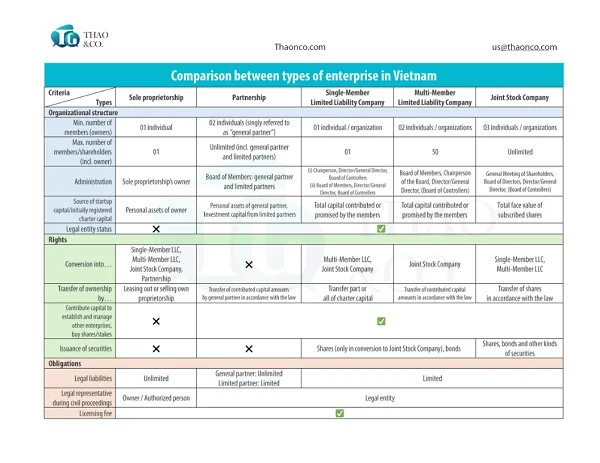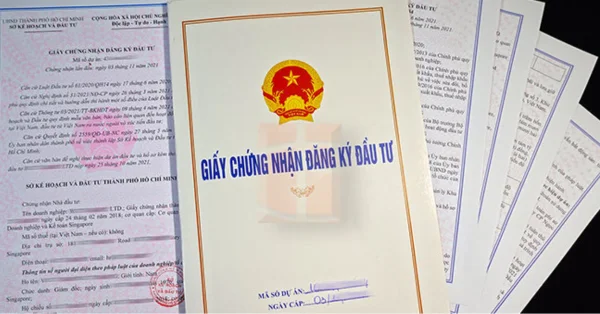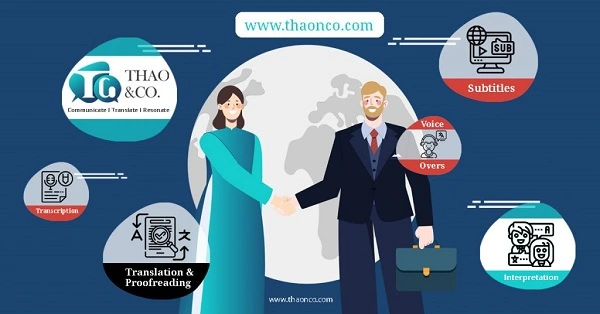Thinking of setting up a business in Vietnam as a foreigner? Wondering about the requirements and procedures? In this guide, Thao & Co. breaks down everything you need to know to get your business up and running, with easy-to-follow information on the whole process.
Key points:
- ▫ The advantages and disadvantages of the Vietnam market
- ▫ Requirements for setting up a business in Vietnam for foreigners
- ▫ Step-by-step guide to establishing your business in Vietnam
As one of the fastest-growing economies in the world, Vietnam has become a prime spot for foreign investors. The Vietnamese government has seized this opportunity by rolling out regulations and policies that make it easier for foreigners to invest and contribute to the country’s economic growth.
So, if you’re wondering whether foreigners can set up a business in Vietnam, the answer is a resounding yes – provided you meet the requirements and comply with local laws.
However, the success of your venture in Vietnam will depend on several factors. Two key elements that play a significant role are your chosen business model and industry, which will greatly influence how you bring your business ideas to life.
To determine whether Vietnam is the right destination for your business, it’s important to weigh the key advantages and disadvantages of this dynamic economy.

▫ Political stability: Vietnam is a single-party state known for its political stability, with low risks of rebellion or terrorism. The government also enforces comprehensive laws to combat cybersecurity threats.
▫ Economic policies: The Vietnamese government actively promotes economic integration and has implemented policies to attract foreign investment. Coupled with a rapidly growing economy, this offers a wealth of opportunities for new businesses.
▫ Human resources: Vietnam possesses a young and talented workforce that’s adaptable to new technologies and equipped with notable skills. Moreover, labor costs in Vietnam are significantly more competitive compared to other countries in the region.
▫ Tax policies: While not everyone may view this as a strong advantage, Vietnam’s tax policies are generally more favorable to foreign investors than those in many neighboring countries.
▫ Legal procedures: Complex legal and administrative procedures have long been an obstacle for foreigners who want to set up a business in Vietnam. Although the government is making consistent efforts to simplify these procedures, in general, the legal procedures for setting up a business are quite complicated and time-consuming.
▫ Language barrier: Vietnamese is the official and dominant language in Vietnam. Although English is already integrated into the national education curriculum, not all Vietnamese are fluent English speakers. This can pose communication challenges for foreign investors.
▫ Cultural differences: Understanding Vietnamese business etiquette and cultural nuances can be tricky for foreign investors unfamiliar with the local culture. Partnering with a local agency can be beneficial in helping you communicate effectively with Vietnamese people and navigate your journey of setting up a business in Vietnam.


The process of setting up a business in Vietnam can vary based on your chosen business model. However, there are 4 main steps that most prospective enterprises must follow to be recognized as legal business entities in Vietnam:
The first step is to decide on the type of enterprise you want to establish. Vietnam recognizes 5 main types of enterprise. Choosing the right one involves considering factors such as:
Here are the recognized types of enterprise in Vietnam:
| No. | Type | What is it? |
| 1. | Sole proprietorship | Owned and invested in by a single individual |
| 2. | Partnership | Founded and co-invested by 2 individuals |
| 3. | Single-member limited liability company | Funded by a single individual or organization |
| 4. | Two-member limited liability company | Funded by 2 individuals or organizations. |
| 5. | Joint-stock company | Requires at least three individuals or organizations as capital contributors. |
For a detailed comparison, download
🔽Thao & Co.’s PDF guide on Vietnamese types of enterprise

Foreign investors may not always need to obtain an investment registration certificate if certain conditions are met, such as:
However, in most other cases, an investment registration certificate is mandatory for setting up a business in Vietnam. Here’s how to obtain it:
1. A dossier of request for approval of investment policy for an investment project:
2. Submit your prepared documents to the Investment Registration Agency, which could be:
Your application will then be forwarded to the appropriate authority for review.
3. Receive the approval of investment policy for your investment project.
4. Receive your Investment Registration Certificate.

Here’s a step-by-step guide:
1. The required documents will vary depending on your type of enterprise. A standard enterprise registration dossier typically includes:
2. Submit the complete dossier and pay the enterprise registration fee through one of the following 3 methods:
After submission, you’ll need to wait for approval and then receive your Enterprise Registration Certificate.
3. Within 30 days of receiving your Enterprise Registration Certificate, you must complete the procedure by making a public announcement of its content. This can be done in person, via postal order, or online using the same methods mentioned above.
In certain industries, obtaining a business license is mandatory for enterprises to operate legally in Vietnam. It’s important to note that a business license is different from an enterprise registration certificate.
Some of the industries requiring a business license include:
If your business falls into one of these categories, you must obtain the appropriate business license. The procedure and required documents may vary depending on the specific industry.

Once you have obtained all the necessary documents to legally operate your business in Vietnam, here are the key steps to complete:

When setting up a company in Vietnam, there are several mandatory fees that you’ll need to pay to the authorities:
Other mandatory fees:
Additional expenses depending on your needs:
To sum up, the cost of setting up a company in Vietnam for foreigners can range up to tens of millions of VND, depending on the business scale and industry. Therefore, it is best to conduct thorough research, create a detailed investment plan, and consider partnering with a professional service provider to navigate the process smoothly.

Here are answers to some of the most frequently asked questions about starting a business in Vietnam as a foreigner:
Yes. Foreigners can establish a 100% foreign-owned business in Vietnam, provided that the business operates in non-conditional industries. However, some industries require joint ventures with local partners or have restrictions on the foreign capital contribution ratio.
Yes, foreign investors can serve as the legal representative, founding shareholder, or capital contributor of a company in Vietnam. If you are the legal representative of your business, make sure you comply with the local regulations and have a valid address in Vietnam.

When naming a company in Vietnam, the following rules apply:
When registering your business address in Vietnam, ensure that it meets the following criteria:
Partnering with business setup service providers can offer several benefits, but it’s important to weigh the pros and cons:
Advantages:
Disadvantages:
Vietnam, with its welcoming market and abundant potential, is the perfect destination for foreign investors to bring their business ideas to life.
Every journey comes with its own set of challenges. In this case, the language barrier and navigating a foreign legal system are among the first hurdles you’ll face.
> Need help with the administrative process so that you can focus on your business strategy?
> Want to understand the complex legal regulations?

Let Thao & Co. assist you in the most professional and efficient way! With extensive knowledge and experience, our legal experts will help you navigate through every procedure.
Our services include:
✅ Legal consultation and enterprise type selection: Get expert advice to choose the right business structure that aligns with your goals.
✅ Document preparation and submission: We handle your enterprise registration paperwork from start to finish.
✅ Legalization and notarized translation services: Ensure your documents meet all legal requirements with our translation services.
✅ Investment registration and other legal documentation support: We assist with all necessary legal documents, including investment registration.
✅ Comprehensive support throughout the entire process: From the initial consultation to the final steps, we’re with you every step of the way.
As a native agency fluent in English, we serve as your personal guide, helping you communicate effectively with local authorities and understand Vietnam’s culture and legal procedures.
By choosing Thao & Co., you will experience dedicated support and transparency at every stage of your project.
This is exactly what every entrepreneur seeks when venturing into new markets!
Thao & Co. – Your trusted partner in conquering the Vietnam market. Contact us now for a detailed consultation and take the first step toward your success!